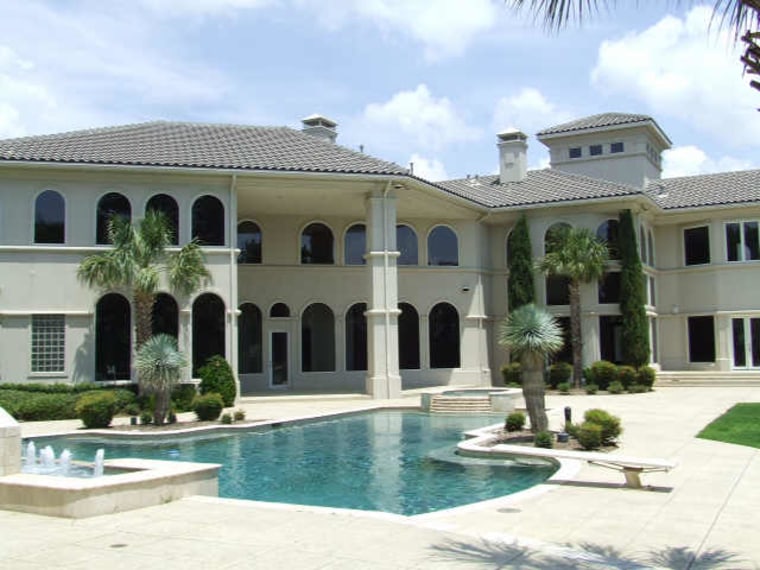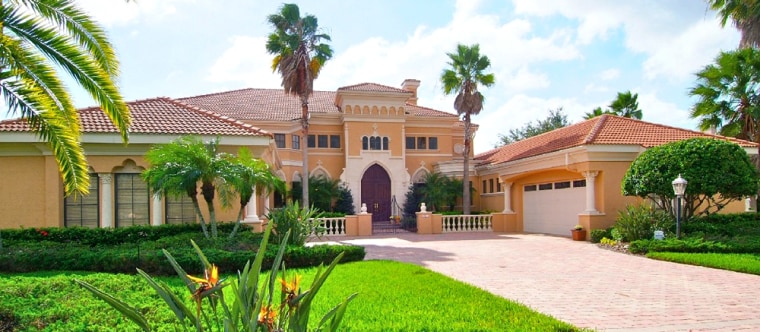In 2003, Robert Provost snapped up a $2.5 million villa with its own boat dock in Sarasota, Fla. A finance chief for an auto-sales chain, Mr. Provost earned more than $250,000 a year and had an impeccable credit history.
Then he lost his job. Mr. Provost missed one $10,500 mortgage payment, then another. This month, the 53-year-old put his house, a five-bedroom with sweeping views of an intercoastal waterway, on the market for $3.4 million. But the listing has thus far attracted little interest. Mr. Provost says he expects to receive a notice of default from the bank — the first step to foreclosure — in the next month or two.
"A foreclosure would be devastating," he says. "My wife and I would have to start from scratch."
The housing crisis that swept through working-class and middle-class communities across the country is now creeping into the leafy driveways and the gated communities of the nation's most exclusive towns.
One symptom of these times: a surge in the number of million-dollar foreclosures. According to RealtyTrac, the number of homes valued at more than $1 million that are in some stage of foreclosure has swelled to 7,968 between January and August. That compares with 4,214 during the same period last year.
The number of $2 million-plus homes in the process of foreclosure has grown even faster, surging to 499 in the year-to-date compared with 201 for the same period last year. Home values are based on comparable, recent sales in the neighborhoods.
It wasn't long ago that bidding wars over luxury properties were commonplace, as buyers emboldened by the booming housing market paid ever-dearer premiums for what seemed like a no-lose investment. More than 64,300 homes priced at $1 million or more sold in 2007, more than triple the number in 2002, according to DataQuick.

Now tighter credit, rising job losses in finance and management, wildly volatile financial markets and falling home prices have started squeezing the most affluent. Patricia Tan, a broker in Florida with several million-dollar distressed listings and foreclosures, says her clients usually fall into three categories: executives who lost their jobs, homeowners who traded up to a larger house but couldn't sell their first, and speculators and flippers.
What all these groups have in common is that they lacked sufficient financial wiggle room if the market went south. Experts say it's becoming apparent that the even the well-to-do weren't immune to the aggressive lending practices of the go-go years.
"If you've got a lender who pushed them to the limit and you have some change in supply or demand, you'll have foreclosures," says Karl Case, the Wellesley College economist associated with the widely followed S&P/Case-Shiller index of U.S. housing prices. "Loans were unbelievably risky in every category," adds Tom Lawler, a housing economist in Leesburg, Va. "We're seeing the results of that lending in the high end."
The problems at the high end are only expected to grow. While luxury properties still make up a tiny slice of the overall foreclosure market — the number of total filings surged to 303,879 in August of this year — brokers specializing in foreclosures say banks are increasingly calling them to appraise foreclosed homes worth $1 million or more. (Foreclosures, the process by which lenders assume ownership of a house, usually are initiated when a borrower is more than 90 days behind in payments, although many lenders are now waiting longer and cutting deals with homeowners to avoid foreclosure.)
And according to a new report from UBS, delinquencies are rising rapidly for "jumbo prime" mortgages — large loans made to high-quality borrowers. About 4 percent of adjustable rate mortgages for prime borrowers who took out mortgages in 2007 have missed more than two monthly payments, up from just 0.52 percent for loans issued in 2005. Total jumbo mortgages outstanding could total about $1.34 trillion, according to UBS.
The wave of expected layoffs at Lehman Brothers Holdings and Merrill Lynch, combined with previous cuts on Wall Street, is likely to worsen conditions in the Northeast, Mr. Case, the economist, predicts.
For now, the biggest concentration of luxury foreclosures is in the Sunbelt. According to RealtyTrac, California accounted for more than half the nation's total of million-dollar foreclosures, with 4,756 homes in the year-to-date ending in August. Florida ranked second with 1,088, followed by Nevada with 215. California and Florida have for months been among the biggest losers in the national housing downturn.
Adam Fenn, a Nevada broker who specializes in foreclosures, says he had no million-dollar listings last year. Now he's trying to sell about 20 homes in the $1 million-plus range, and expects to have several priced at more than $2 million in the next month or two.
Several of his listings are in prestigious golf communities. One home that he's about to list in the Seven Hills community was purchased for $4.3 million in January 2007.
After foreclosure by Washington Mutual, the home is now on the market for $1.749 million, and Mr. Fenn says the price may lowered. "From what the banks are telling me, we're just at the beginning," he says. "High-end foreclosures are getting to be a daily occurrence."
Perched on the edge of Silicon Valley, the tony suburb of Los Gatos, Calif., is lined with mansions and is home to tech entrepreneurs, venture capitalists and software tycoons. It's also home to a foreclosure: a 3,000-square-foot, four-bedroom home on Loma Vista Avenue whose buyer stopped making mortgage payments before he could finish a major renovation.
The house was purchased in 2005 for $815,000. After assuming ownership the home's lender finished the renovation, which includes Brazilian-wood floors, vaulted cathedral ceilings and high-end Electrolux appliances. The home is now on the market for $1.6588 million.
"This is not a neighborhood where you hear the word 'foreclosure,' " says real-estate agent David Mortaz. He and the bank declined to identify the buyer.
Georgia real-estate agent Dwayne Richardson recently got a foreclosure listing unlike anything he had seen before — a 7,168-square-foot mansion perched on Lake Blue Ridge, about an hour and a half from Atlanta. The home boasts a home theater, soaring views of the lake and a its own high-security, 10-by-10-foot bank vault.
Mr. Richardson said the Atlanta-based owner was a housing investor who defaulted on the mortgage, forcing the house into foreclosure. The home is now listed for $2 million, though Mr. Richardson says the price may soon be reduced.
An even bigger home is in Greenwich, Conn., ground zero for hedge-fund billionaires. The Internal Revenue Service recently scheduled a foreclosure on the five-acre estate owned by Michael Lauer. A hedge-fund manager, Mr. Lauer and four others were charged earlier this year by the Securities and Exchange Commission with conspiracy and wire fraud in a scheme that allegedly cost investors more than $200 million between 1999 and 2003. The 7,328-square-foot home at 7 Dwight Lane will be sold Sept. 26 at auction. The starting bid is $2.5 million.
For speculators, the bust is a painful reminder of how risky real estate investing can be. In 2005, Florida-based business owner Jim Scalici teamed up with some partners and purchased a 5,700-square-foot home in the Lakewood Ranch community in Bradenton, Fla., for $2.1 million. His plan was to rehab the home and either buy out the partners or sell it to another buyer and split the profits.
In the fall of 2006, however, the partners walked away and Mr. Scalici took on the mortgage payments and taxes. He put the home up for sale for $3.8 million, but it failed to sell. Mr. Scalici stopped making mortgage payments in August. After a long dispute, Countrywide Financial, which holds the mortgage, demanded a new appraisal, which valued the home at $1.4 million. Countrywide is now in talks to sell the home for $1.4 million or less.
"It breaks my heart to see this house sell for such a small amount," Mr. Scalici says. "It doesn't make sense."
